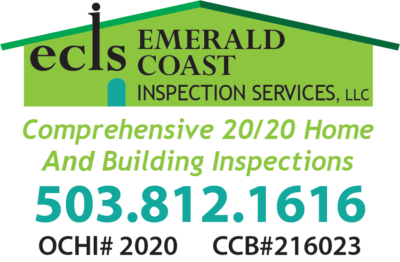What does a home inspection include?
A home inspection involves the visual, non-destructive examination and analysis of the readily accessible areas and systems of your home from the roof to the foundation both inside and out. Those systems and areas include:
- Structural System
- Exterior & Grounds
- Roof System
- Plumbing System
- Electrical System
- Heating System
- Air Conditioning Systems
- Interior
- Insulation and Ventilation
- Fireplaces and Solid Fuel Burning Appliances
We perform every inspection in accordance with the State of Oregon Home Inspector Standards of Behavior and Standards of Practice Administrative Rules (OAR Division 8, Chapter 812).
We also comply with the American Institute of Inspectors Standards of Practice.
Why should you have a home inspected?
A home inspection gives the buyer more detailed information about the overall condition of the home prior to purchase. In a home inspection, a qualified inspector takes an in-depth, unbiased look at your potential new home to:
- Evaluate the physical condition: structure, construction, and mechanical systems;
- Identify items that need to be repaired or replaced; and
- Estimate the remaining useful life of the major systems, equipment, structure, and finishes.
It is your responsibility to be an informed buyer. Be sure that what you buy is satisfactory in every respect. You have the right to carefully examine your potential new home with a licensed, qualified home inspector. You may arrange to do so before signing your contract, or may do so after signing the contract as long as your contract states that the sale of the home is contingent on the inspection.
Does a house pass or fail a home inspection?
No. A home inspection is an evaluation of the condition of the house at the time of the inspection. It is not a code compliance inspection and is not an appraisal of the value of a property. The inspection report will include the condition details of what is found by the inspector.
What does a home inspection cost?
Home inspection fees will vary with the size and age of the house, whether there are detached buildings that will be included, and other factors. There may be additional inspections that you want to include such as a sewer scope, radon testing, etc. These services are not part of a home inspection and are provided by others. Do not let cost be a factor when deciding in the selection of your home inspector. The sense of security and knowledge gained from an inspection is well worth the cost, and the lowest-priced inspection is not necessarily a bargain. Use the inspector’s qualifications including experience, training, reputation, and professional affiliations as a guide.
What if the report reveals any issues?
No house is perfect. If the inspector identifies issues, it doesn’t mean you should or shouldn’t buy the house, only that you will know in advance what the condition of your home was at the time of the inspection. If your budget is tight, or if you don’t want to become involved in future repair work, the inspection report information will be important to you. If major problems are found, you and your real estate agent may be able to negotiate for repairs, allowances or the home price with the seller or seller's agent. The home inspector provides the information to you but cannot instruct you on how to use it. We will be happy to explain any information in more detail.
